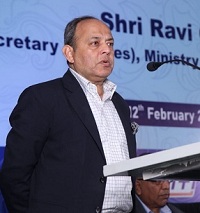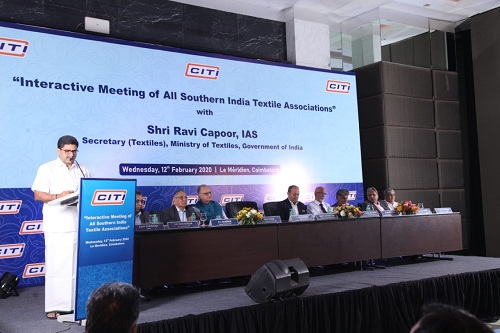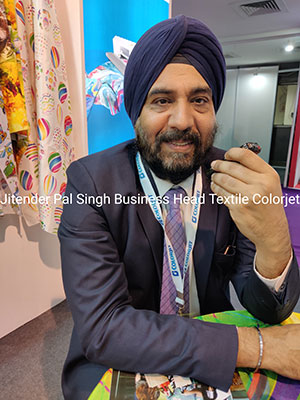FW
 The Confederation of Indian Textile Industry (CITI), the National apex body for the textiles & clothing industry across the nation, organised an interactive meeting with Ravi Capoor, Secretary, Ministry of Textiles, Government of India with the office-bearers of 48 textile Associations in South India representing the entire textile value chain. The office-bearers / representatives of other National apex bodies such as AEPC, TEXPROCIL, PDEXCIL, SRTEPC, AMFII also participated in the interactive meeting.
The Confederation of Indian Textile Industry (CITI), the National apex body for the textiles & clothing industry across the nation, organised an interactive meeting with Ravi Capoor, Secretary, Ministry of Textiles, Government of India with the office-bearers of 48 textile Associations in South India representing the entire textile value chain. The office-bearers / representatives of other National apex bodies such as AEPC, TEXPROCIL, PDEXCIL, SRTEPC, AMFII also participated in the interactive meeting.
Around 200 industrialists representing the entire textile value chain from South India and members of National Committee for Textiles & Clothing (NCTC) attended the meeting. All these associations thanked the Prime Minister and the Union Minister for Textiles and Secretary (Textiles) for removing the anti-dumping duty levied on PTA. According to them, this initiative enables indigenous fiber and filament manufacturers to reduce the price considerably.
The Textile Secretary advised the textile industry to grab the opportunities by diversifying into polyester segment to boost exports. He appreciated the initiatives taken by Tirupur and Coimbatore to implementzero liquid discharge to protect the environment, predominantly using non-conventional energy to avoid carbon food print, apart from complying various labour and other social statutes. He advised Tirupur Knitwear Cluster to brand its garments and products under sustainable programme that might fetch much larger margin globally and Government would extend all necessary support to promote the brand.
to boost exports. He appreciated the initiatives taken by Tirupur and Coimbatore to implementzero liquid discharge to protect the environment, predominantly using non-conventional energy to avoid carbon food print, apart from complying various labour and other social statutes. He advised Tirupur Knitwear Cluster to brand its garments and products under sustainable programme that might fetch much larger margin globally and Government would extend all necessary support to promote the brand.
The Textile Secretary also indicated that the government would address all the structural issues in its new National Textile Policy that is likely to be announced in a couple of months. The policy will encourage development of 10 mega textile parks on over 1,000 acre of land closer to the ports, giving plug and play facilities including the necessary safeguard measures in the labour laws. Capoor also indicated addressing the power cost, credit cost and its availability; the government would also make efforts to expedite conclusion of FTAs with EU, UK and other countries to boost the exports.
T. Rajkumar stated that the Government has identified the textile industry as the thrust area and in real terms “Make in India” facilities without any imports right from fibre to finished goods, ensures inclusive growth by providing jobs to all skill levels especially the rural masses and women folks. He further stated that the Government would also announce a scheme to set up dedicated textile parks for technical textiles, textile machinery manufacturing with the state-of-the-art technology spares, accessories, parts to promote import substitution thereby reducing the capital cost substantially as India is currently depending on imported technology barring spinning sector. The government is also exploring the possibilities of setting up R & D centres with the state-of-the-art facilities for each segment of the textile industry.
 A 25-year old company, Colorjet is involved in manufacturing digital printing machines. The company makes signage and textile printers. “Our machines minimise environment pressure by running on a reactive ink and consuming 25 per cent less water. Also, they need less air-conditioning which lowers carbo emissions and footprint,” says Jitender Pal Singh, Business Head-Textile Division, Colorjet.
A 25-year old company, Colorjet is involved in manufacturing digital printing machines. The company makes signage and textile printers. “Our machines minimise environment pressure by running on a reactive ink and consuming 25 per cent less water. Also, they need less air-conditioning which lowers carbo emissions and footprint,” says Jitender Pal Singh, Business Head-Textile Division, Colorjet.
Having a 70 percent share in the sale of textile printing products in India, Colorjet serves global customers. “We not only build our own machines but also design and develop them. Their production speed is 3,000 meters a day,” notes Singh. “Our customers cater to both domestic and export markets. Most of them are plain service providers who do job work for printing. A few customers have their in house brands,” he adds.
Colorjet has dealers and distributors in key countries. “We have teams in India and Dubai. Our production facilities are spread across the country. In the west, we are located in Surat and Mumbai; while in the north we are available in Delhi NCR and Punjab. We also operate in the South and East and all other major digital textile printing areas,” elaborates Singh.
Internationally, Colorjet operates in countries such as Greece, Dubai, Pakistan, Bangladesh, Sri Lanka, China, Spain. “We now plan to expand to Turkey, Indonesia, Thailand, Brazil,” he adds. Elaborating on the digital printing scenario in India, Singh says, “Almost 90 percent of the digital printing in India is done for apparel. The remaining ten percent is for home furnishing. Globally it is the same ratio, 85 to 15,” states Singh.
Besides offering direct to fabric and sublimation machines for the apparel industry, Colorjet also offer machines for reactive ring, dispersing. “Usually digital printing is done on 1.8 meters and 3.2 meters. We offer machines for both segments,” adds Singh.
Singh reveals that digital textile printing comprises less than five percent of total textile printing. Despite this, the company’s business is growing as customers are shifting from conventional printing technology to digital printing technology. “This technology has low operating costs and is low maintenance. It also shortens job runs,” adds Singh Increasing strain on spinning, weaving and big process houses is driving people to digital printing as they look for pigment solutions. And Colorjet offers them good pigment solutions for a water crisis.
The 5th edition of Resilient Tirupur, held on February 8, 2020, brought together all stakeholders of the apparel industry who renewed their commitment to achieving business growth and wellbeing of millions of people associated with this industry. The event was attended by over 1,000 participants including factory owners, supply chain partners, senior professionals and students from textile/fashion institutes.
Surinder Jain, Business Director of Wazir Advisors emphasised on the need to increase India’s share of exports to the US and EU. He said, Chinese exporters have an advantage over India due to lower interest costs, lower overheads due to economies of scale and high efficiencies. He spoke of a Virtual Integration model practised by Chinese groups. He cited the example of GTT group where a core group of companies does all customer facing functions like marketing, merchandising, design - product development and approvals whereas the order execution functions like fabric trims and garment production are conducted by other factories located nearby and profits get shared by the entire group. The group has a $4 billion turnover. Due to these reasons, China is competitive in spite of higher labour cost compared to India.
Raja Shanmugham, President, Tirupur Exporters Association, explained how business in Tirupur has grown three fold in last six years with the hard work of entrepreneurs and stakeholders. He expressed delight over the positive business developments in Tirupur. Though workers in Tirupur are superior, the overall control of raw material sourcing and coordination between the supply chain partners in Tirupur is low. In Bangladesh, leading factories ensure that all inputs are in the factory before starting production and this helps in achieving high productivity.
The event was organised by Tirupur Exporters Association and NIFT TEA Institute in association with Sripuram Trust and TTPK and sponsored by Reliance and Birla Cellulose.
Shortly after the announcement to postpone the premiere of denim fabrics trade show Denimsandjeans Japan to be held in Tokyo March 4-5 due to the outbreak of Coronavirus, the organisers released a new date for the show’s debut. It will now being held from September 29-30, 2020. The initial location at Sunshine City Convention Center in Tokyo as well as the timing will remain the same.
The Japan show has been planned in view of the importance of Japan being a very important part of denim innovation globally as well as it has a long history in Indigo and denim and has been able to teach a few lessons to the global community in terms of technological and fashion directions that the industry takes. The uniqueness and ethos of Japanese Fashion have always inspired the global denim community and designers look for Japanese Trends as an inspiration. It is a pole of attraction for designers from brands around the world who go there is a search of inspirations from the perfectionist fashion creations of the Japanese designers. So far as the volume is concerned, over 180 million pieces of denim coming to Japan every year.
Denimsandjeans runs additional denim events this year in Ho Chi Minh City, Vietnam and Bengaluru.
Contemporary womenswear trade show Coterie has announced Colleen Sherin as its new president. In her previous position Sherin was vice president of wholesale at Alexander McQueen. Before that, she worked for over 15 years for Saks Fifth Avenue.
As a collaborative leader and with her innate and organic ability to strategically partner with brands, retailers, and media, Colleen will drive impactful partnerships that will elevate the COTERIE brand and strengthen connections for the womenswear community.
Coterie is held biannually in New York City and focuses on contemporary womenswear fashion, footwear and accessories brands.
H&M’s upcoming Conscious Exclusive collection will be the first ever collection to feature newly patented material Circulose. It means it’s the first time chemically recycled fibres are being used in garments sold at scale. The material is produced by re:newcell. It uses discarded textiles and is able to “replace forest raw material, in commercial quantities, without compromising on the quality”.
And the whole process that recycles the cotton and viscose fibres adds further to the circularity of Circulose because it uses a closed loop system for water and chemicals powered by renewable energy. H&M’s Investment Manager for Sustainable Fashion at the group’s investment arm CO:LAB, Erik Karlsson, said re:newcell’s work "perfectly aligns with our vision to become fully circular”.
Although this is its first use at scale, it’s still fairly limited in that it’s found in a single dress in a single collection. That dress is made of a mix of 50% Circulose from recycled jeans and 50 per cent viscose from FSC-certified wood, and will go on sale globally in the spring. But even a single garment can have a big impact when it’s produced by a company of the size of H&M and the fact that it’s to be available worldwide also adds to that impact.
India International Knit Fair will be held in Tirupur, February 17 to 19, 2020. The aim is to promote business development in the Indian knitwear industry. The trade show will feature a wide array of men’s women’s, and children’s readymade knitwear and aims to create a platform from which to discuss upcoming knitwear trends, link businesses together, and promote the Indian knitwear industry. The business-to-business trade show caters to manufacturers, buyers from both India and abroad, wholesalers, and designers, among others. This is a platform for building contacts, developing business prospects, working on major tie-ups and partnerships.
Tirupur is the knitwear capital of India. The share of Tirupur knitwear exports in India’s total garment exports is 20 per cent. More than 80 per cent of the industries in this sector are medium and small scale. This is the right time for the knitwear sector to capture the market that’s leaving China, due to an increase in cost of manufacturing. The best of the brand leaders, stores, wholesalers, importers identify Tirupur as one of the major sources for the consumer’s requirements. IIKF has emerged as one among the most reputed knitwear trade fairs in the world. It aims to showcase end-to-end products pertaining to the knitwear segment.
Ralph Lauren, the American fashion brand, has successfully piloted a new fast track model that takes only 16 days to execute a sweatshirt from design to development. The company is continuously making efforts to shorten its lead time from design to shelf. Moreover, it aims to have more than 50 per cent of its product on lead time of 6 months or less.
The model was an experiment to see the output. Leveraging its investment in digital product development, the brand designed, produced and delivered exclusive fleece sweaters to a key wholesale customer in just 16 days. The product was manufactured in Mainland China.
Moreover, the company is working to move almost 80 per cent of sports shirts on to 6 months or less. Since last two years, the fashion firm is also diversifying its supply chain to make it less dependent on any one market.
Exports of Turkish textile and raw materials in 2019 decreased 5.5 per cent compared to the previous year. The share of textile and raw material exports in total exports decreased from 5.9 per cent to 5.5 per cent.
In 2019, the main export market for Turkish textile and raw material was 28 EU countries. Despite 8.2 per cent decrease, the share of textile exports to these markets was 49.9 per cent. Exports to the former Eastern Bloc increased 5.9 per cent. African countries ranked third among the biggest export markets. Exports to these countries decreased by 1.7 per cent.
Woven fabrics were the most important product group of textile and raw materials exports in 2019. Exports of woven fabrics, which account for 23.5 per cent of textile and raw material exports, decreased by 6.6 per cent compared to the previous year. Yarn exports decreased by 6.1 per cent. Home textiles constitute 15.9 per cent of the textile sector’s exports. This group’s exports increased 1.8 per cent. The share of fiber in total textile exports decreased from 13.7 to 6.4 per cent. Denim fabric exports decreased 11.5 per cent.
For the third quarter Welspun’s net profit went up 50 per cent. Welspun’s emerging businesses collectively continue to grow by around 30 per cent. The company continues to build on a differentiation strategy based on branding, innovation and sustainability. The flooring business reached 50 distributors and 450 dealers, pan-India. Welspun believes its flooring business will be a game-changer in India. The business will offer stone polymer composite luxury performance tiles, carpet tiles, wall-to-wall carpets and artificial grass. This will provide convenience and customisation to customers and stakeholders such as contractors and distributors. The company’s flooring plant in Hyderabad is spread over 27 million sq. mt. The new vertical is expected to generate sales of around Rs 100 crores in the current financial year. The tile market in India is worth Rs 35,000 crores. Flooring business is expected to help Welspun grow in double digits.
Welspun is the world’s largest maker of terry towels. Welspun is going into advanced textiles.The big bet on advanced textiles includes making disposable towels out of non-woven textiles and filters for the auto and power sector. Advanced textiles will broadbase Welspun’s clientele by adding sectors such as auto, healthcare and FMCG. The company is known for bed sheets and towels and has introduced reversible bed sheets and quick-dry towels.












